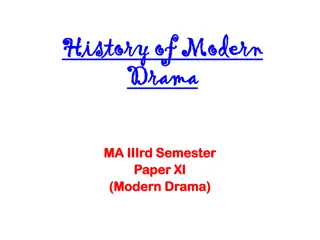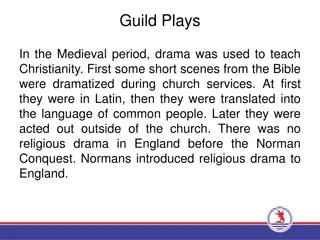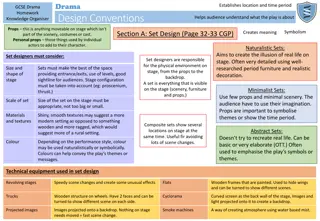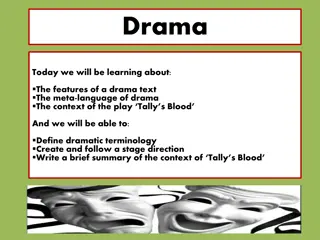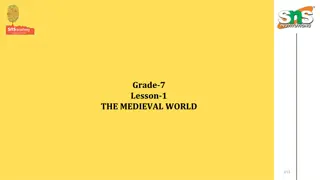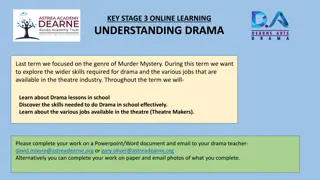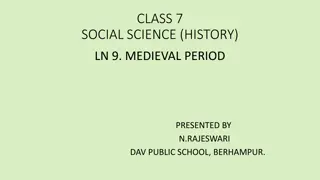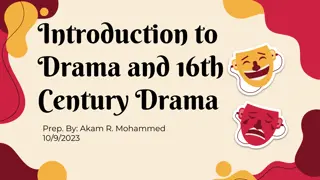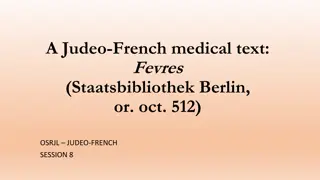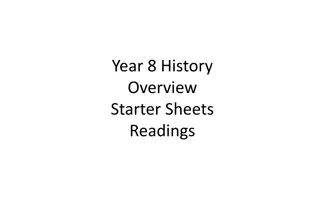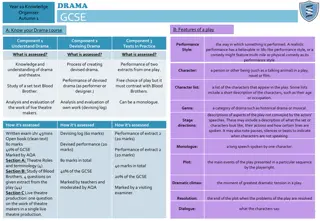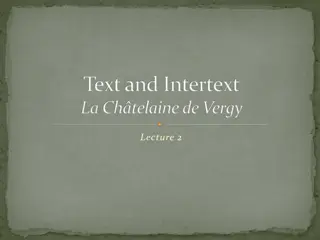Medieval Cycle Plays and Mystery Drama Traditions
Dive into the world of Medieval Cycle Plays, including Mystery Plays, Passion Plays, and the Guilds that sponsored these performances. Discover the origins, significance, and cultural impact of these historical theatrical traditions, from Mystery Play Guilds to the iconic Oberammergau Passion Play. Explore the intricacies of York and Wakefield Cycles, as well as the innovative use of pageant wagons and special effects in bringing biblical stories to life on stage.
Download Presentation

Please find below an Image/Link to download the presentation.
The content on the website is provided AS IS for your information and personal use only. It may not be sold, licensed, or shared on other websites without obtaining consent from the author.If you encounter any issues during the download, it is possible that the publisher has removed the file from their server.
You are allowed to download the files provided on this website for personal or commercial use, subject to the condition that they are used lawfully. All files are the property of their respective owners.
The content on the website is provided AS IS for your information and personal use only. It may not be sold, licensed, or shared on other websites without obtaining consent from the author.
E N D
Presentation Transcript
MEDIEVAL CYCLE PLAYS
Mystery Play Guilds Pageant wagon York Cycle Wakefield Cycle Oberammergau Miracle Play Everyman Passion Play VOCABULARY
Mystery from Latin meaning occupation Told Bible stories Used for education and entertainment Performed in England, Spain, France, and Germany MYSTERY PLAYS
Guilds are early forms of todays labor unions Guilds sponsored specific plays in Mystery Cycles Not all mystery plays used guilds, but larger cycles did Did not use professional actors, but guild members Guilds sponsored plays related to their craft: Carpenters would sponsor the story of Noah s Ark Bakers would sponsor the story of the Loaves and Fishes Butchers would sponsor crucifixion scenes Goldsmiths would sponsor the Maji visiting the Christ child GUILDS
Mystery plays existed in cycles of plays Plays were moved to different audiences Wagons were built for specific scenes Featured moveable panels Special effects like trap doors and smoke Pageant wagons pulled by actors PAGEANT WAGON
York, England YORK AND WAKEFIELD CYCLES Cycle of 48 plays Cover Biblical history from Creation to the Last Judgement Still performed in four-year intervals Wakefield, England Contain 32 scriptural plays High quality writing attributed to Wakefield Master Creative use of Language, rhyme, and meter Second Shepherds Play regarded as masterpiece of medieval literature
Passion play depicting Christs passion 1643 residents of Oberammergau dedicated themselves to the play s performance when it seemed their town was spared by bubonic plague Originally play performed annually Proved too expensive, so schedule reduced to every four years Now produced annually and is a great tourist attraction OBERAMMERGAU
Everyman represents every man Late 15thcentury Story of man s salvation EVERYMAN Salvation gained through leading holy life, performing charitable acts, and attending to religious practice Many modern version like Seuss Horton the Elephant, Popeye,

 undefined
undefined




 undefined
undefined




